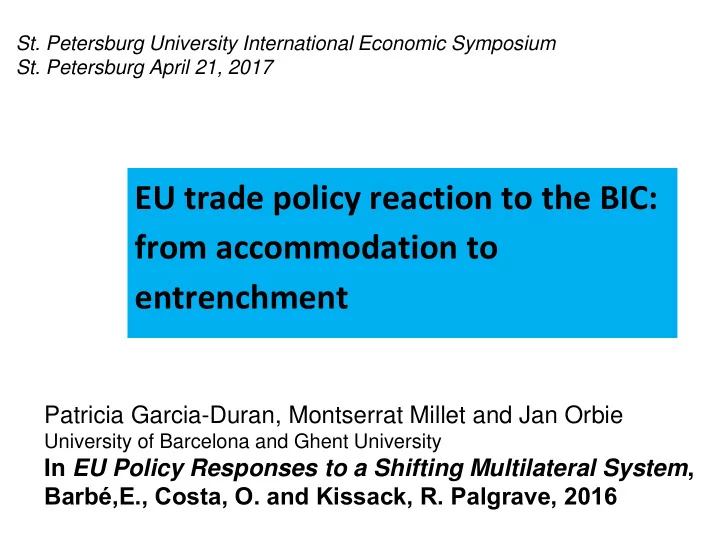

St. Petersburg University International Economic Symposium St. Petersburg April 21, 2017 EU trade policy reaction to the BIC: from accommodation to entrenchment Patricia Garcia-Duran, Montserrat Millet and Jan Orbie University of Barcelona and Ghent University In EU Policy Responses to a Shifting Multilateral System , Barbé,E., Costa, O. and Kissack, R. Palgrave, 2016
CHANGE Rupture in the structure of international trade: 2003 WTO Cancun Summit Before Cancun: Hegemonic structure – balance between ideas, institutions and the distribution of power among states. After Cancun: Normative congruence structure – Shift in the distribution of power – new Quad
EU REACTION Accommodation - decision-making adaptation 2009-today in the DDR -negotiation concessions Entrenchment in DDR -FTA with emerging countries 2004-2008 - lack of negotiation concessions in DDR - FTA with Old Quad members
INTERPRETATION Entrenchment as EU’s second -best.
Assumption: the EU wants a multilateral agreement EU recent bilateral negotiations and agreements should be seen at worst as complementary to multilateral negotiations at the Doha Round and at best as promoters.
Accommodation helps multilateralism -> Bilateral agreements with emerging powers cannot become substitutes to a multilateral agreement (do not include larger markets or deep WTO+ or WTO-X issues) -> Efforts in CAP reform (2003 and 2008) would have not been made otherwise
Entrenchment endangers multilateralism The “exit tactic” If we do not reach a multilateral agreement we are going to create an alternative system Emerging countries will lower their expectations and facilitate a multilateral agreement
Entrenchment endangers multilateralism It may not work. -> Emerging countries may not be prepared to accept the multilateral agreement even in these circumstances (coalition rigidities and FTA race) -> Bilateral agreements with Old Quad partners can become substitutes to a multilateral accord (better best alternative) especially if one takes into account WTO-X issues
Conclusion BIC emergence as veto players has lead to a CHANGE in the international structure of trade: from hegemonic to normative congruence EU REACTION has evolved over time: from accommodation to entrenchment INTERPRETATION: entrenchment is EU’s second-best option if effective multilateralism continues to be its leitmotiv in trade.
Conclusion Nairobi 2015 gives support to this interpretation
Recommend
More recommend